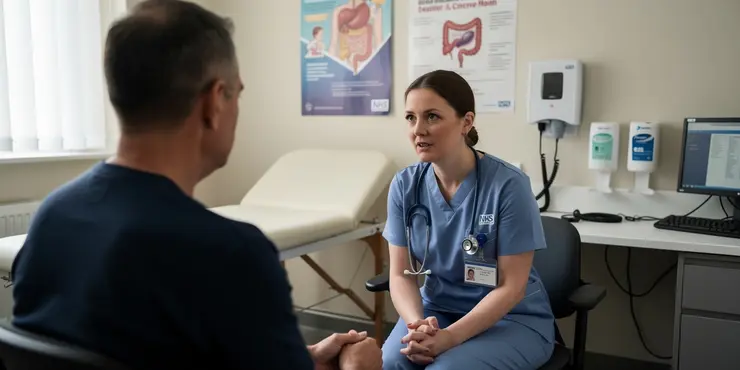
Find Help
More Items From Ergsy search
-
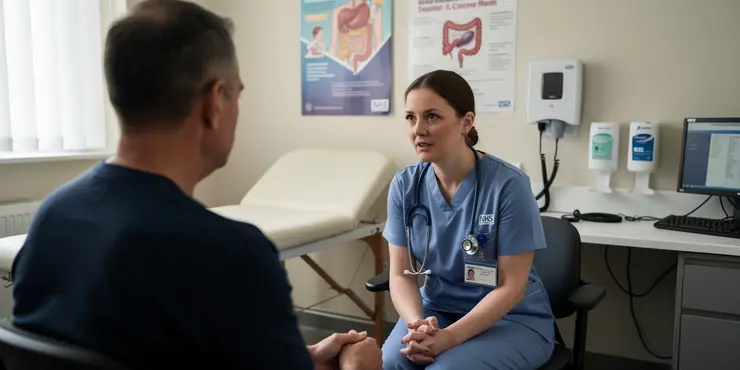
What is the survival rate for bowel cancer?
Relevance: 100%
-
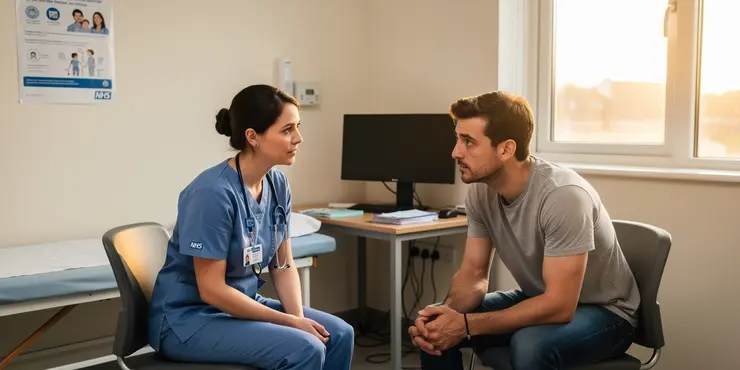
What is the survival rate for testicular cancer?
Relevance: 72%
-

Can AI predict lung cancer survival rates?
Relevance: 62%
-

How common is bowel cancer?
Relevance: 61%
-
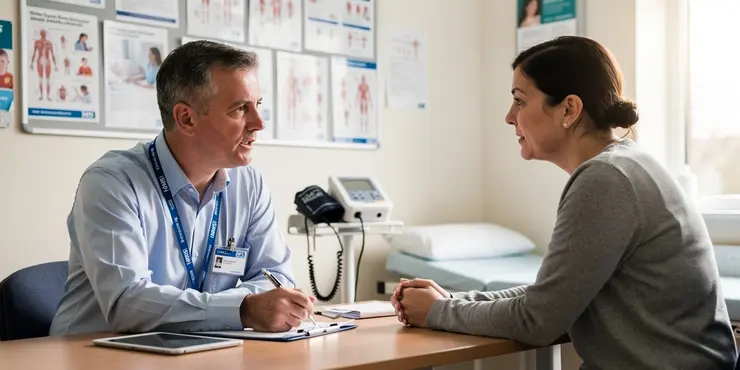
Why is there a surge in bowel cancer?
Relevance: 59%
-
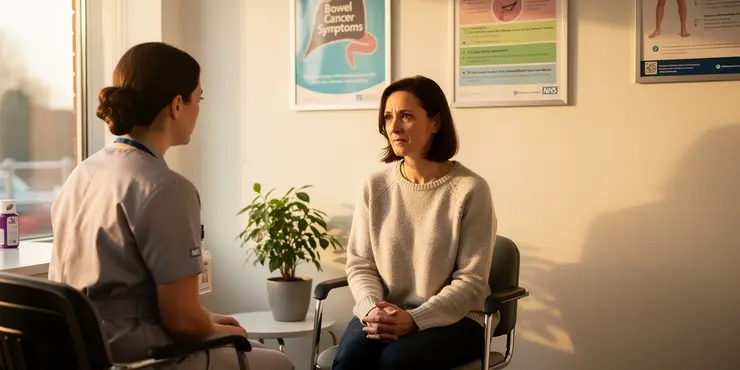
What is Bowel Cancer?
Relevance: 58%
-
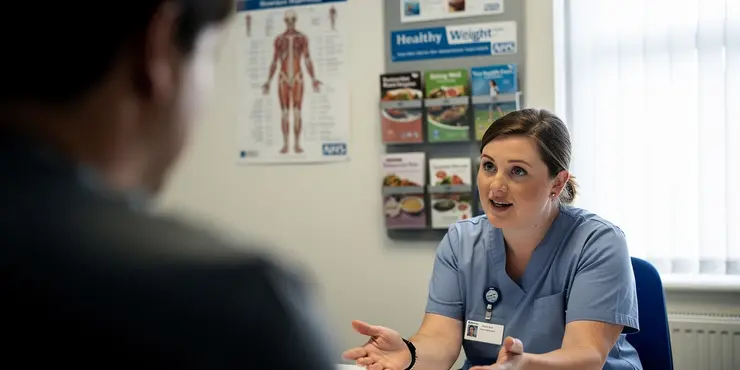
How does obesity affect bowel cancer rates?
Relevance: 58%
-
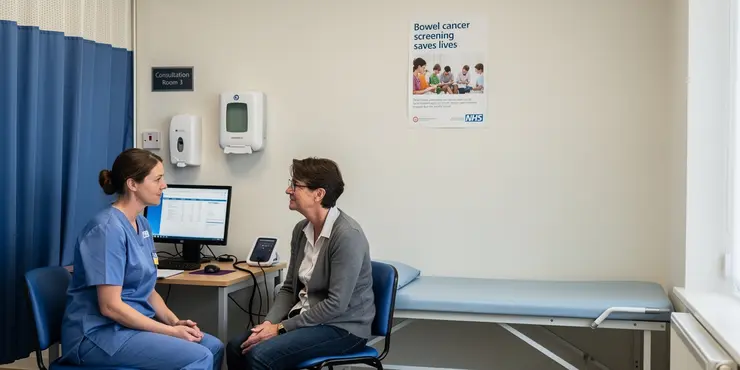
How does increased screening impact bowel cancer statistics?
Relevance: 57%
-

Can exercise help slow down the progression of bowel cancer?
Relevance: 55%
-
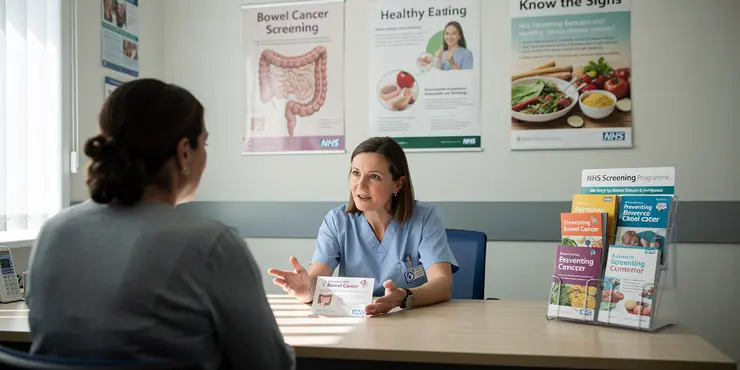
Can bowel cancer be prevented?
Relevance: 54%
-
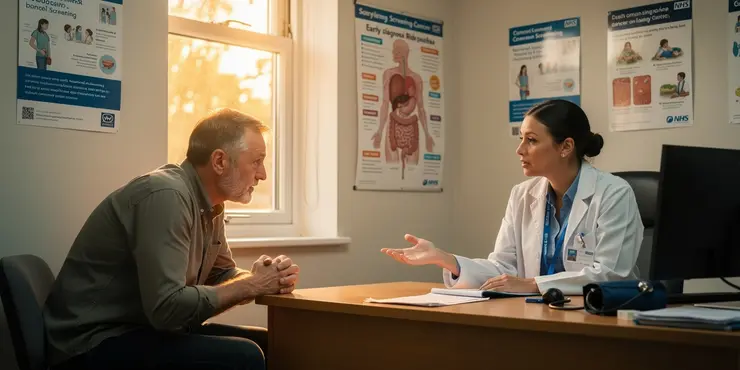
How is bowel cancer diagnosed?
Relevance: 54%
-

Can exercise help slow down the progression of bowel cancer?
Relevance: 53%
-
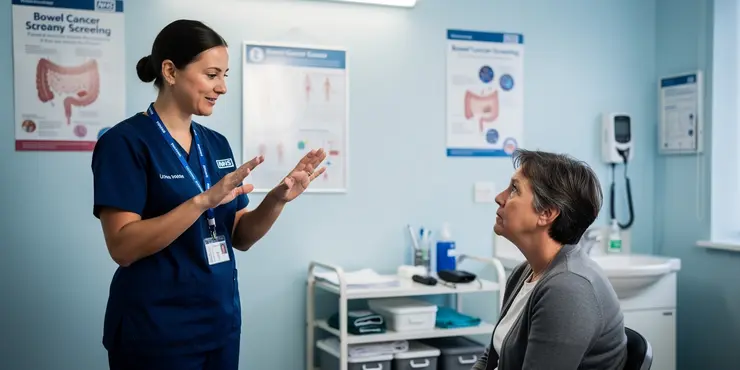
Learn about bowel cancer (British Sign Language version)
Relevance: 52%
-
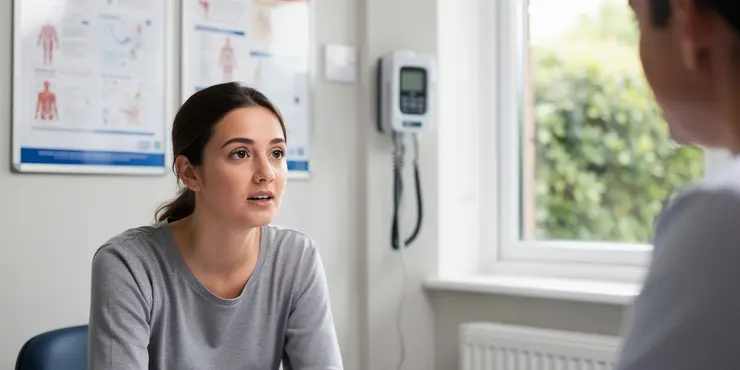
Are younger people being diagnosed with bowel cancer more frequently?
Relevance: 51%
-
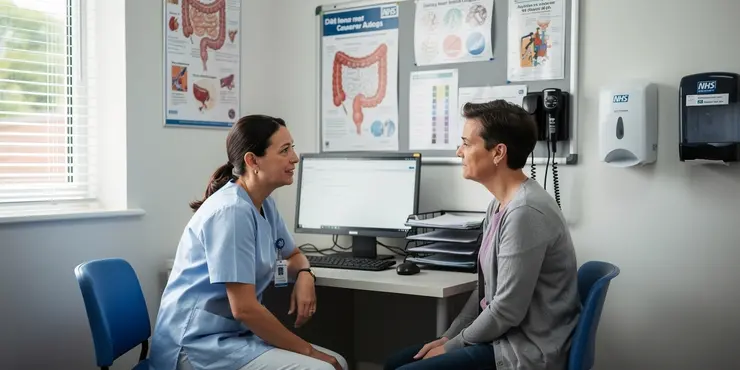
How is the stage of bowel cancer determined?
Relevance: 51%
-

Are there specific benefits of exercise for bowel cancer survivors?
Relevance: 50%
-
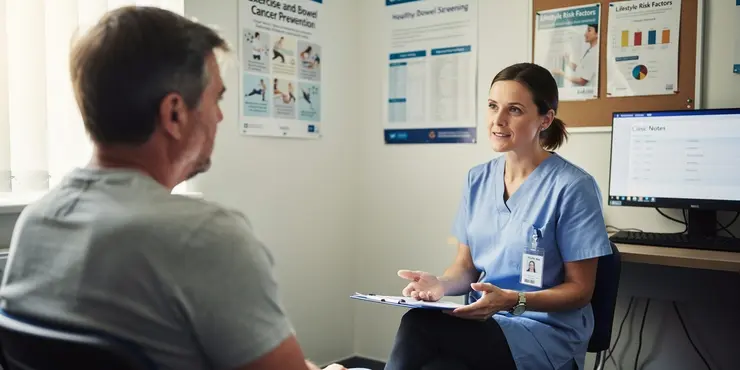
How does exercise impact bowel cancer progression?
Relevance: 50%
-
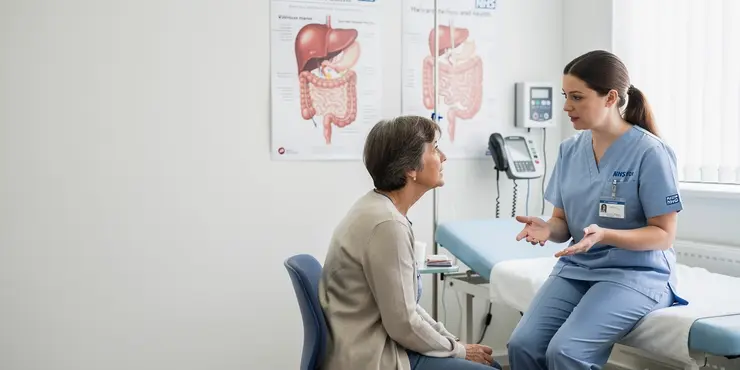
Is diet linked to the rise in bowel cancer?
Relevance: 49%
-
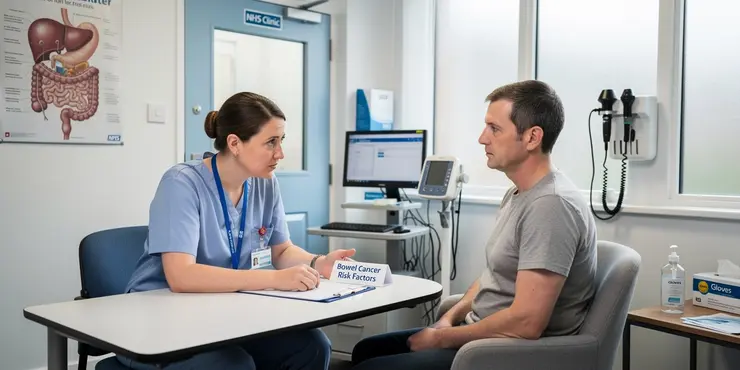
What factors are contributing to the increase in bowel cancer cases?
Relevance: 49%
-
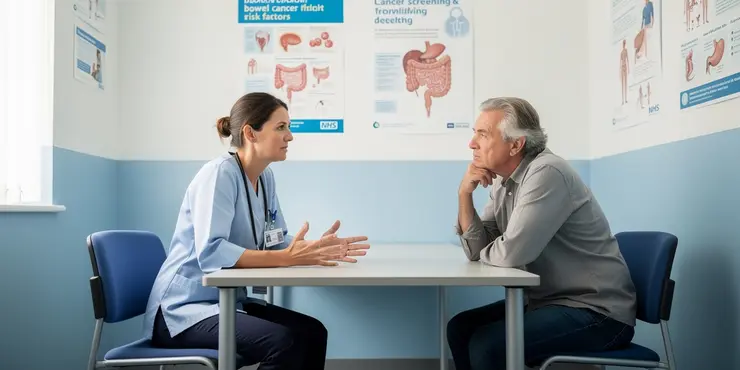
What are the risk factors for bowel cancer?
Relevance: 48%
-
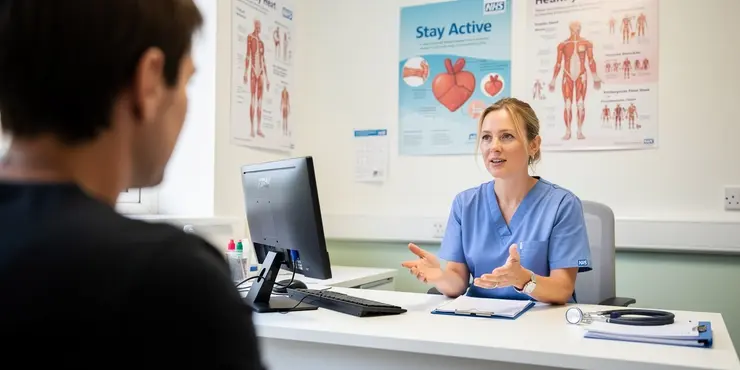
What types of exercise are beneficial for bowel cancer patients?
Relevance: 47%
-
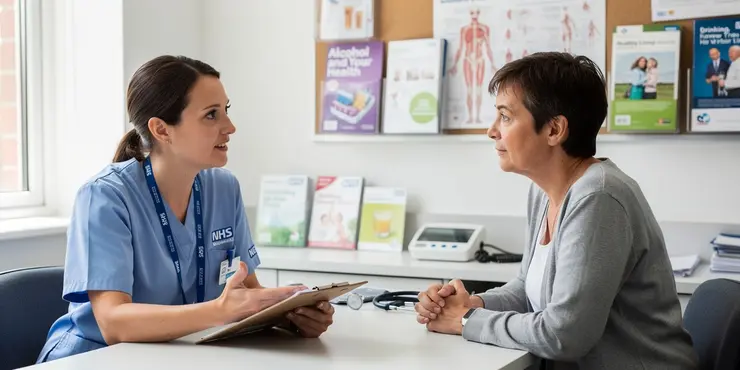
What role does alcohol consumption play in bowel cancer risk?
Relevance: 47%
-
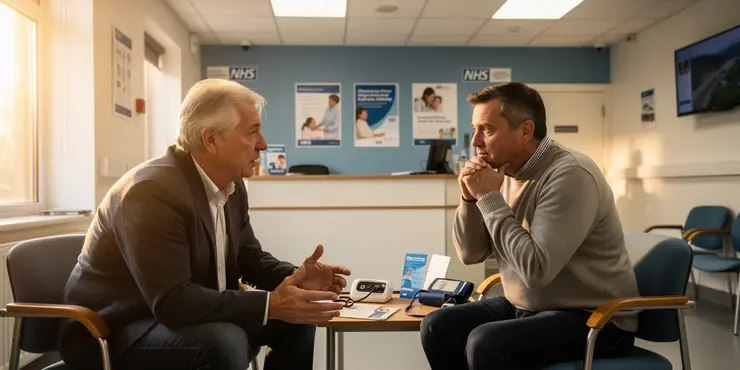
Bowel cancer screening: Alan Titchmarsh and Tommy Walsh | NHS
Relevance: 47%
-
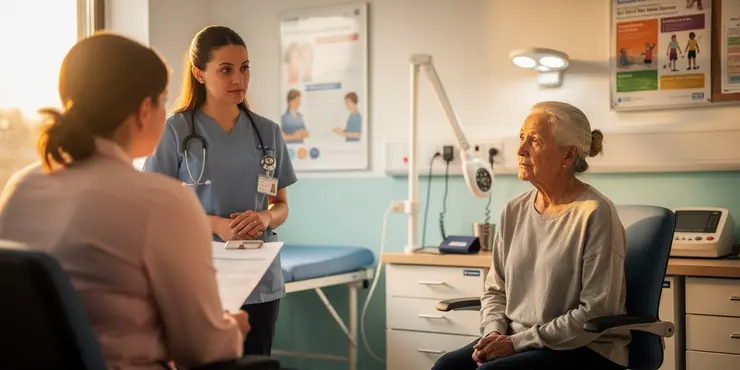
Bowel cancer - Symptoms and signs to look out for
Relevance: 46%
-
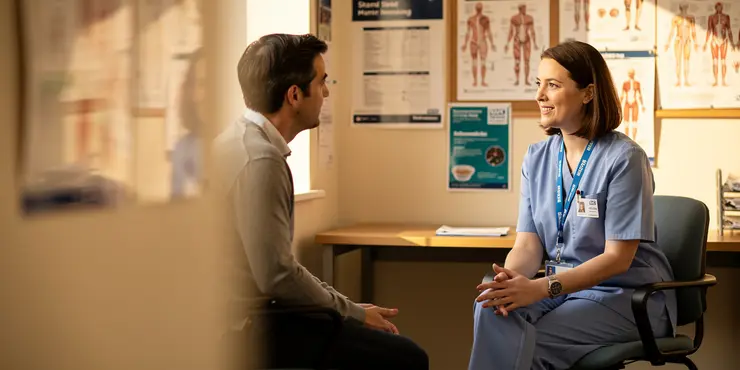
What treatment options are available for bowel cancer?
Relevance: 45%
-
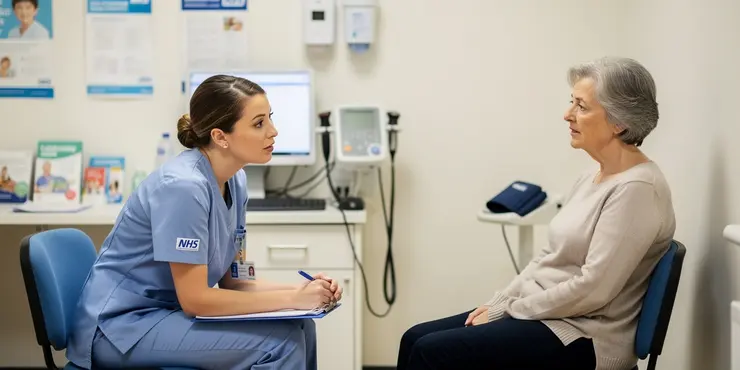
Bowel Cancer
Relevance: 44%
-
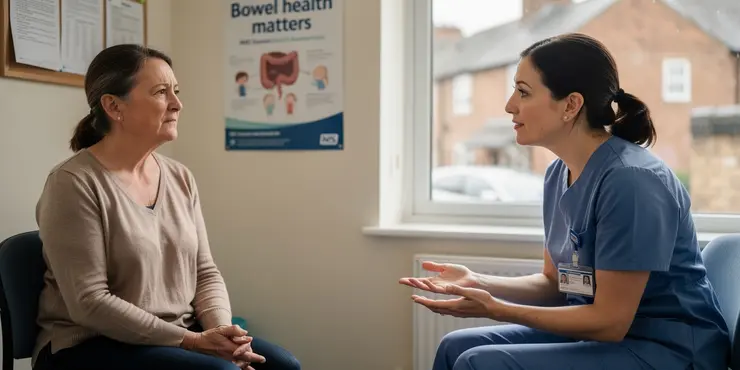
Can bowel cancer spread to other parts of the body?
Relevance: 44%
-

How does family history affect the risk of bowel cancer?
Relevance: 44%
-

Taking a Genetic Family History - The Conversation (Bowel Cancer)
Relevance: 44%
-

What support is available for individuals diagnosed with bowel cancer?
Relevance: 44%
-
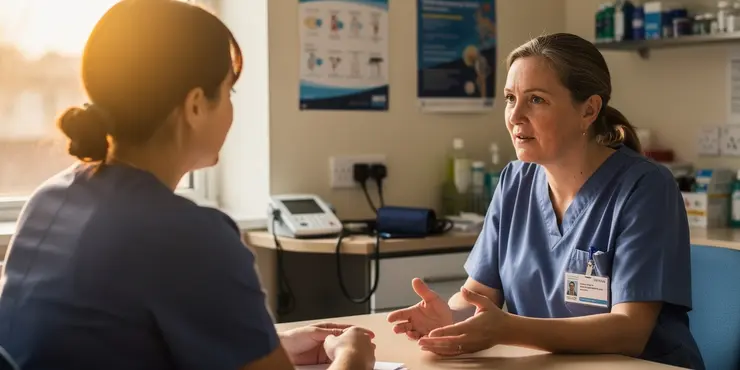
What are the side effects of bowel cancer treatment?
Relevance: 44%
-
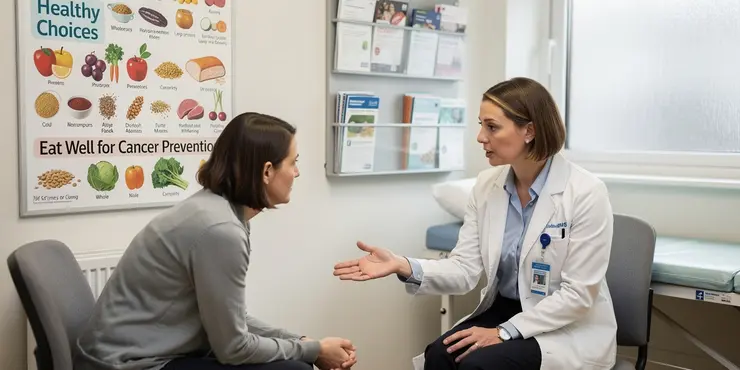
Can lifestyle changes help reduce bowel cancer risk?
Relevance: 43%
-
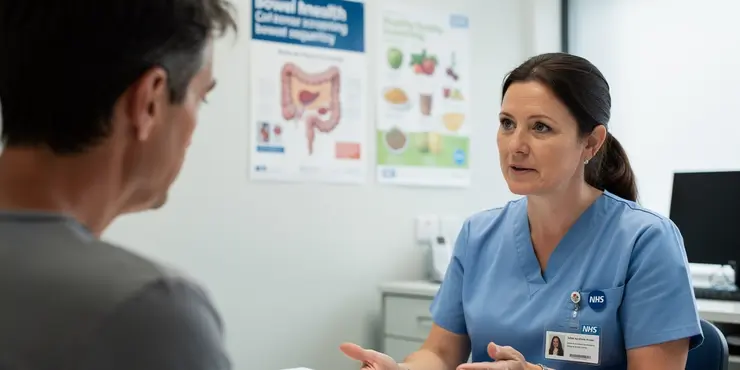
What role does diet play in the risk of developing bowel cancer?
Relevance: 42%
-

What lifestyle changes can help lower the risk of bowel cancer?
Relevance: 42%
-

How to do the FIT bowel cancer screening test | Cancer Research UK
Relevance: 42%
-

What are the recommendations for colorectal cancer screening?
Relevance: 37%
-

Endometrial Cancer
Relevance: 36%
-

What is colorectal cancer?
Relevance: 36%
-
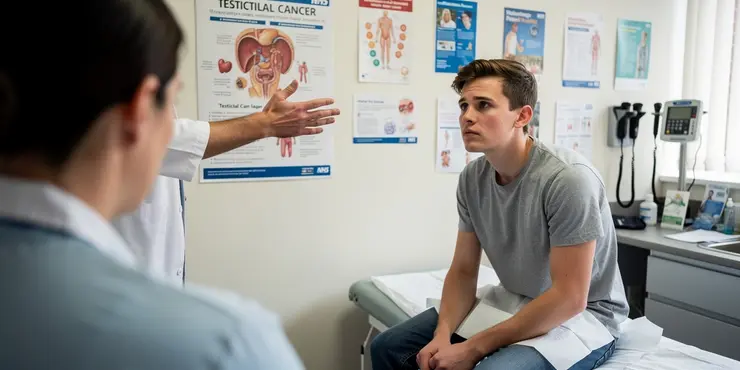
What is testicular cancer?
Relevance: 36%
-
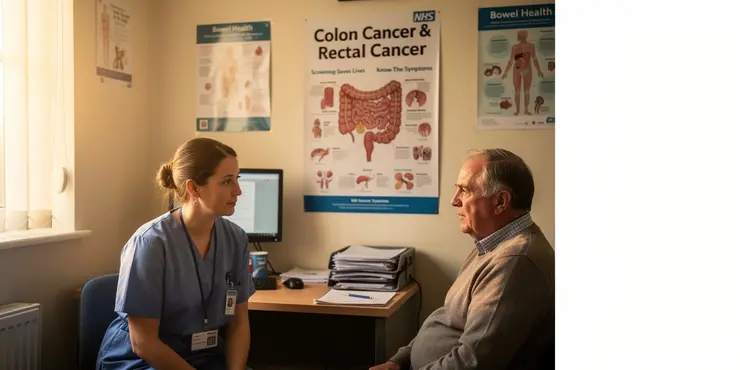
What is the difference between colon cancer and rectal cancer?
Relevance: 36%
Understanding Bowel Cancer Survival Rates in the UK
Bowel cancer, also known as colorectal cancer, is a significant health concern in the UK. It is one of the most common types of cancer, affecting the large bowel, which comprises the colon and rectum. Survival rates are a crucial factor in understanding the prognosis for those diagnosed with this disease. In recent years, the survival rates for bowel cancer in the UK have improved due to advancements in medical treatment and early detection.
General Survival Rates
The survival rate for any cancer, including bowel cancer, is typically expressed as a percentage of people who live for a certain period after diagnosis. In the UK, the overall five-year survival rate for bowel cancer has significantly improved, currently standing at approximately 60% to 65%. This indicates that about 60 to 65 out of every 100 people diagnosed with bowel cancer today are likely to live for at least five years after their diagnosis.
Factors Affecting Survival Rates
Several factors can influence the survival rates for bowel cancer. These include the stage at diagnosis, which is crucial in determining the prognosis. Early-stage bowel cancer (Stage 1 or 2) generally has a higher survival rate compared to advanced stages (Stage 3 or 4). For instance, Stage 1 bowel cancer can have a five-year survival rate exceeding 90%, while Stage 4, indicating cancer has spread to other parts of the body, typically has a much lower survival rate.
Other influencing factors include the patient's age, overall health, response to treatment, and specific characteristics of the cancer itself. Genetic predispositions and lifestyle factors, such as diet, exercise, and smoking status, can also affect outcomes.
Advancements in Treatment
Recent advancements in treatment have positively impacted survival rates for bowel cancer in the UK. Treatments include surgery, chemotherapy, radiotherapy, and targeted therapies. Improved screening programmes, such as the NHS Bowel Cancer Screening Programme, have led to earlier detection, which significantly enhances survival prospects. The UK has also invested in research to better understand this type of cancer, contributing to more effective treatment plans and longer survival times.
Conclusion
In summary, while bowel cancer remains a serious health issue in the UK, the survival rates have improved due to better screening, earlier detection, and advanced treatment options. It is crucial for individuals to participate in regular screenings and to be aware of symptoms, as early detection is vital in improving survival chances. With continued research and medical advancements, the outlook for bowel cancer patients is hopeful and continues to improve.
Understanding Bowel Cancer Survival Rates in the UK
Bowel cancer is also called colorectal cancer. It is a big health problem in the UK. This cancer affects the large bowel, which is the colon and rectum. Survival rates tell us how many people live after getting this cancer. Recently, more people are living longer because of better treatments and finding cancer early.
General Survival Rates
Survival rate means how many people live for some time after finding out they have cancer. In the UK, about 60 to 65 out of 100 people with bowel cancer live for at least five years. This number has gone up, which is good news.
Factors Affecting Survival Rates
Different things can change how long someone lives with bowel cancer. The stage of cancer is very important. Early-stage cancer (Stage 1 or 2) means better chances of living longer. Stage 1 can have more than 90 out of 100 people live for five years. Stage 4 means the cancer has spread, and fewer people live as long.
Other things matter too, like the person's age, health, how they respond to treatment, and the type of cancer. Family history and lifestyle choices, like what you eat, exercise, and not smoking, are important too.
Advancements in Treatment
There are new treatments that help people live longer with bowel cancer in the UK. These include surgery, chemotherapy, radiotherapy, and targeted therapies. Better tests, like the NHS Bowel Cancer Screening, help find cancer sooner. The UK is also doing a lot of research to make treatments better and help people live longer.
Conclusion
To sum up, bowel cancer is a serious health issue in the UK. But survival rates are better now because of improved testing, finding cancer early, and new treatments. It is important for people to get regular check-ups and know the signs of cancer. Early detection is key to better survival chances. With ongoing research and new medical advances, things are looking hopeful for people with bowel cancer.
Frequently Asked Questions
What is the survival rate for bowel cancer overall?
The 5-year survival rate for bowel cancer can vary, but on average, it is around 63%.
What is the survival rate for early-stage bowel cancer?
If diagnosed at an early stage, the survival rate for bowel cancer can be higher than 90%.
How does the stage of bowel cancer affect survival rates?
Survival rates are generally higher for earlier stages of bowel cancer and lower for advanced stages.
What is the survival rate for Stage 2 bowel cancer?
The 5-year survival rate for Stage 2 bowel cancer is approximately 70-80%.
What is the survival rate for Stage 3 bowel cancer?
The 5-year survival rate for Stage 3 bowel cancer is roughly 40-70%.
What is the survival rate for Stage 4 bowel cancer?
The 5-year survival rate for Stage 4 bowel cancer is about 10-15%.
How does age affect bowel cancer survival rates?
Survival rates tend to be lower for older patients due to factors like overall health and comorbidities.
Can treatment impact bowel cancer survival rates?
Yes, advancements in treatment such as surgery and chemotherapy can significantly improve survival rates.
Do lifestyle changes affect bowel cancer survival rates?
Yes, maintaining a healthy lifestyle, including a balanced diet and regular exercise, can improve outcomes and survival rates.
What is the importance of early detection in bowel cancer survival?
Early detection is crucial as it typically leads to a better prognosis and higher survival rates.
How do genetic factors affect bowel cancer survival rates?
Genetic factors can influence the aggressiveness of the cancer and the response to treatment, which may affect survival rates.
What role does screening play in bowel cancer survival rates?
Regular screening can detect bowel cancer early, significantly improving the chance of successful treatment and higher survival rates.
How does the location of the tumor in the bowel affect survival rates?
The location can impact prognosis, as tumors in certain areas may be more easily treated than others.
What is the survival rate for recurrent bowel cancer?
Survival rates for recurrent bowel cancer vary but are generally lower than for cancer that is detected and treated initially.
Can bowel cancer be completely cured?
Early-stage bowel cancer can often be cured, especially with effective treatment and early detection.
Does bowel cancer survival rate differ by gender?
There may be slight differences, but overall survival rates tend to be similar between men and women.
How reliable are bowel cancer survival rate statistics?
Survival rate statistics are based on large population studies and can vary based on individual circumstances.
What are the main factors influencing bowel cancer survival rates?
Key factors include the stage at diagnosis, patient's overall health, response to treatment, and tumor characteristics.
Are there any advancements in bowel cancer treatment improving survival rates?
Yes, new treatments like targeted therapy and immunotherapy are showing promise in improving survival rates for bowel cancer.
How do comorbidities affect bowel cancer survival rates?
Comorbidities can complicate treatment and may lead to lower survival rates due to the complexity they add to treatment plans.
How many people live after having bowel cancer?
More people are living for a long time after getting bowel cancer.
Doctors help people get better with different treatments.
If you or someone you know has bowel cancer, talk to a doctor for help.
You can also use pictures or videos to learn more about bowel cancer.
If 100 people have bowel cancer, about 63 of them will still be alive after 5 years. This is what we call the survival rate.
How many people get better when bowel cancer is found early?
If doctors find bowel cancer early, more than 90 out of 100 people can get better.
How does the stage of bowel cancer affect survival rates?
People with bowel cancer can get better. But how sick they are depends on the stage of cancer. The 'stage' tells us how big the cancer is and if it has spread to other parts of the body.
If doctors find the cancer early, it is often easier to treat. This means people have a better chance of getting better.
If the cancer is at a later stage, it might be harder to treat. This could mean the person might not get better as easily.
Doctors use different tests to find out the stage of cancer. They can make a plan to help the person get the best care. Family and friends can also help by giving support.
People have a better chance of getting better from bowel cancer if it is found early. It is harder to get better if the cancer is found late.
How many people get better from Stage 2 bowel cancer?
About 7 to 8 out of every 10 people with Stage 2 bowel cancer live for at least 5 more years after being diagnosed. This is called the 5-year survival rate.
How many people live after having Stage 3 bowel cancer?
Out of 100 people with Stage 3 bowel cancer, about 40 to 70 people will live for 5 more years.
How long do people live with Stage 4 bowel cancer?
Many people want to know how long they might live when they have a sickness called Stage 4 bowel cancer. This is a very serious illness.
Doctors have a word for this, called "survival rate." It tells us how many people live for a certain time with Stage 4 bowel cancer. This might be 1 year, 5 years, or more.
Many things can change how long someone lives. Some people get medicine or care from doctors that helps them feel better longer.
If you want to understand more, you can ask a doctor or a nurse. They can explain things in a way that is easy to understand.
You can also draw a picture or write down questions and answers to help you remember. Friends, family, or someone you trust can be there to help too.
If someone has Stage 4 bowel cancer, about 10 to 15 out of every 100 people will live for 5 years or more.
How does age change bowel cancer survival chances?
Age can change how well someone can get better from bowel cancer.
Older people might have a harder time getting better.
Younger people might have a better chance.
Helpful tips:
- Talk to a doctor for support and answers.
- Get regular check-ups.
- Eat healthy food and stay active.
Older people have a harder time getting better because they might have other health problems.
Can treatment help people live longer with bowel cancer?
Yes, new treatments like surgery and medicine can help people live longer.
Can changing your lifestyle help you live longer with bowel cancer?
If you have bowel cancer, making changes to how you live might help you live longer.
Here are some things you can do:
- Eat healthy foods like fruits and vegetables.
- Try to move your body every day, like by walking or playing.
- Stop smoking if you smoke.
- Drink less alcohol.
You can talk to your doctor or nurse for more help. They can give you ideas to help you stay healthy.
Yes, living healthy is really important. Eating good food and moving your body helps you stay well and live longer.
Why is it important to find bowel cancer early?
Finding bowel cancer early can help save lives. If we discover it soon, doctors can treat it better. Finding it early gives you the best chance to get well. Here are some ways to find it early:
- Go to regular health check-ups.
- Talk to your doctor if you notice anything unusual with your body.
These steps can help you stay healthy!
Finding a health problem early is very important. It can help doctors treat the problem better, and more people get healthy.
How do genes change bowel cancer survival chances?
Some tiny parts in our bodies called genes can change how well people get better from bowel cancer.
Genes are like a set of instructions that tell our bodies how to work.
Doctors study these genes to find out who might need extra help when they have bowel cancer.
If you know someone with bowel cancer, it's good to talk to a doctor. They can explain more and help with any worries.
Some tools that can help are:
- Picture books to explain genes and cancer in simple ways.
- Talking to a nurse to answer questions with easy words.
- Family support to talk through feelings.
Genes can change how strong cancer is. Genes can also change how well treatment works. These things can change how long a person lives.
Helpful tools: - Use pictures to help understand words. - Talk with someone about what you read.
How does screening help people survive bowel cancer?
Getting checked by a doctor can find bowel cancer early. This means there is a better chance to treat it and live longer.
Does the place of the tumor in the bowel change how likely someone is to get better?
Where the tumor is can affect how well treatment works. Some spots are easier to treat than others.
How long do people live if bowel cancer comes back?
Recurrent bowel cancer is when bowel cancer comes back. People usually have less chance of getting better than when it is found and treated the first time.
Can bowel cancer be completely cured?
Bowel cancer is a disease that affects the tummy. Doctors can often help people get better with medicine and surgeries.
The chance of curing bowel cancer depends on each person. It is important to find it early.
Going to doctors and getting check-ups can help. If you find problems early, doctors have a better chance to make it all better.
Talking to doctors and family can be helpful. They can give support and answer questions.
Bowel cancer is a type of cancer that affects the stomach and intestines. If we find bowel cancer when it's just starting, doctors can often help you get better. This is because they can treat it early and stop it from getting worse.
Do men and women survive bowel cancer differently?
This question asks if men and women have different chances of getting better from bowel cancer.
Tools to help:
- Use a dictionary to understand words you don't know.
- Ask someone to read it with you and explain.
- Use text-to-speech to hear the question out loud.
Men and women have about the same chance of living for a long time.
Can we trust bowel cancer survival numbers?
Survival rate numbers come from studies with lots of people. These numbers can change because people are different.
What helps people live longer with bowel cancer?
Important things to think about are:
- When the illness is found
- The person's health
- How the person gets better with treatment
- What the tumor is like
Are there new ways to treat bowel cancer that help people live longer?
Yes, there are new treatments for bowel cancer. They are called targeted therapy and immunotherapy. These treatments are helping more people live longer.
How do other health problems change survival chances for bowel cancer?
If someone has bowel cancer, their survival chances can change if they have other health problems too.
These other health problems are called "comorbidities."
Having comorbidities might make it harder to fight bowel cancer.
It's important to work with doctors to manage all health problems.
Tools like picture charts or a symptom diary can help explain how you're feeling to health professionals.
Having more than one illness at the same time can make treatment harder. This can make it more difficult to get better. It might lower the chances of staying healthy for a long time.
Useful Links
This website offers general information and is not a substitute for professional advice.
Always seek guidance from qualified professionals.
If you have any medical concerns or need urgent help, contact a healthcare professional or emergency services immediately.
Some of this content was generated with AI assistance. We’ve done our best to keep it accurate, helpful, and human-friendly.
- Ergsy carfully checks the information in the videos we provide here.
- Videos shown by Youtube after a video has completed, have NOT been reviewed by ERGSY.
- To view, click the arrow in centre of video.
- Most of the videos you find here will have subtitles and/or closed captions available.
- You may need to turn these on, and choose your preferred language.
- Go to the video you'd like to watch.
- If closed captions (CC) are available, settings will be visible on the bottom right of the video player.
- To turn on Captions, click settings .
- To turn off Captions, click settings again.
More Items From Ergsy search
-

What is the survival rate for bowel cancer?
Relevance: 100%
-

What is the survival rate for testicular cancer?
Relevance: 72%
-

Can AI predict lung cancer survival rates?
Relevance: 62%
-

How common is bowel cancer?
Relevance: 61%
-

Why is there a surge in bowel cancer?
Relevance: 59%
-

What is Bowel Cancer?
Relevance: 58%
-

How does obesity affect bowel cancer rates?
Relevance: 58%
-

How does increased screening impact bowel cancer statistics?
Relevance: 57%
-

Can exercise help slow down the progression of bowel cancer?
Relevance: 55%
-

Can bowel cancer be prevented?
Relevance: 54%
-

How is bowel cancer diagnosed?
Relevance: 54%
-

Can exercise help slow down the progression of bowel cancer?
Relevance: 53%
-

Learn about bowel cancer (British Sign Language version)
Relevance: 52%
-

Are younger people being diagnosed with bowel cancer more frequently?
Relevance: 51%
-

How is the stage of bowel cancer determined?
Relevance: 51%
-

Are there specific benefits of exercise for bowel cancer survivors?
Relevance: 50%
-

How does exercise impact bowel cancer progression?
Relevance: 50%
-

Is diet linked to the rise in bowel cancer?
Relevance: 49%
-

What factors are contributing to the increase in bowel cancer cases?
Relevance: 49%
-

What are the risk factors for bowel cancer?
Relevance: 48%
-

What types of exercise are beneficial for bowel cancer patients?
Relevance: 47%
-

What role does alcohol consumption play in bowel cancer risk?
Relevance: 47%
-

Bowel cancer screening: Alan Titchmarsh and Tommy Walsh | NHS
Relevance: 47%
-

Bowel cancer - Symptoms and signs to look out for
Relevance: 46%
-

What treatment options are available for bowel cancer?
Relevance: 45%
-

Bowel Cancer
Relevance: 44%
-

Can bowel cancer spread to other parts of the body?
Relevance: 44%
-

How does family history affect the risk of bowel cancer?
Relevance: 44%
-

Taking a Genetic Family History - The Conversation (Bowel Cancer)
Relevance: 44%
-

What support is available for individuals diagnosed with bowel cancer?
Relevance: 44%
-

What are the side effects of bowel cancer treatment?
Relevance: 44%
-

Can lifestyle changes help reduce bowel cancer risk?
Relevance: 43%
-

What role does diet play in the risk of developing bowel cancer?
Relevance: 42%
-

What lifestyle changes can help lower the risk of bowel cancer?
Relevance: 42%
-

How to do the FIT bowel cancer screening test | Cancer Research UK
Relevance: 42%
-

What are the recommendations for colorectal cancer screening?
Relevance: 37%
-

Endometrial Cancer
Relevance: 36%
-

What is colorectal cancer?
Relevance: 36%
-

What is testicular cancer?
Relevance: 36%
-

What is the difference between colon cancer and rectal cancer?
Relevance: 36%


